‘I Tried Out For A Reality Dating Show But Got Ghosted After My Photos Showed My Psoriasis’
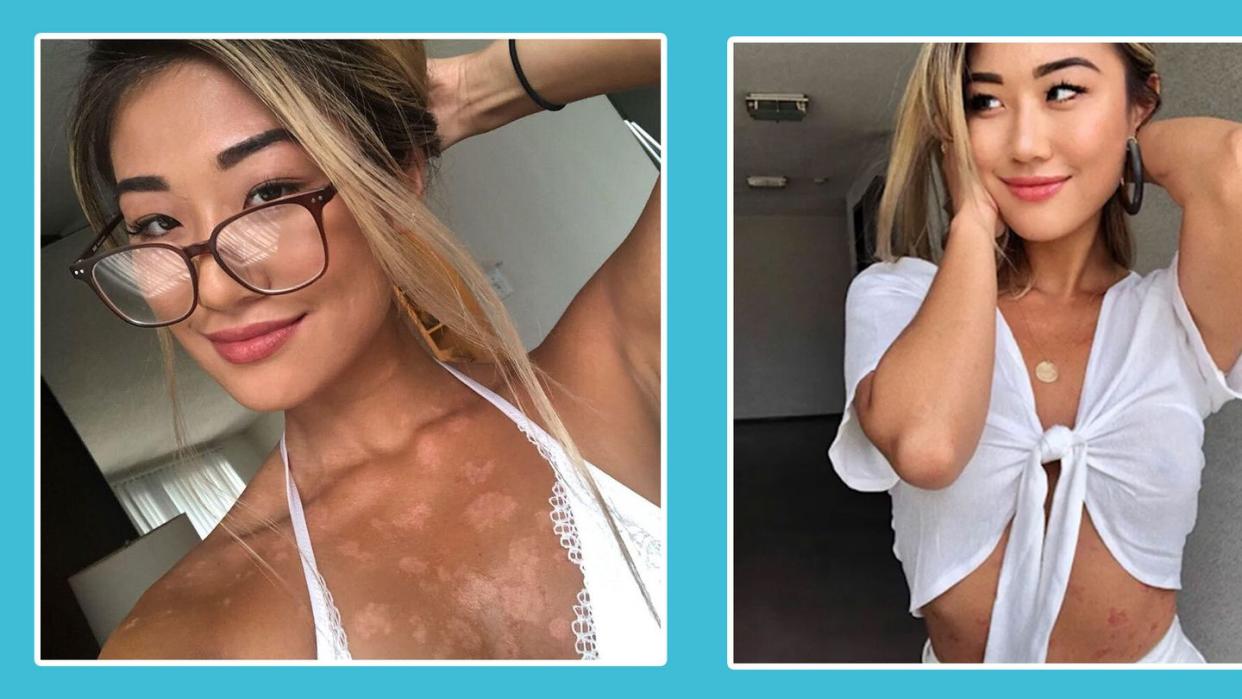
My skin journey started six years ago when I noticed three reddish dots on my calves. At the time, I thought it was nothing—I was used to having sensitive skin and allergic reactions growing up. Then, overnight, those three dots became hundreds of dots all over my body like a red, angry, full-body rash. This led me to an urgent care clinic for a five-minute visit—doctors led me to believe that it was “just an allergic reaction” and sent me home.
Okay, great, I thought. I can just pop a Benadryl and be done. But my skin started to get worse and worse. As days went by, it seemed like new dots were forming. My whole body itched and burned, but doctors weren’t taking me seriously.
So, I decided to return to urgent care. I was told it was a temporary skin rash often caused by viral infections called pityriasis rosea. The doctor sent me away with a cream and looked at me like I was a young kid complaining about a small issue (even though I was 20 at the time). However, I was hopeful and trusted the medical professionals with the diagnosis. They must know what they’re talking about, right?
Even after using cream, the rash worsened over the next couple of weeks.
I decided to see a dermatologist. But the second I walked into the examination room, I felt like I wasn’t being heard. (I was also in the doctor’s office alone—my Korean parents don’t speak English and wouldn’t have been able to understand the doctor.) I was in tears from the physical pain and burning—as well as frustration.
The (male) dermatologist told me I was being dramatic and, like the urgent care doctor, assured me that my condition was pityriasis rosea and that it would go away. It wasn’t something “more chronic” like psoriasis, he said. Like the previous doctor, he prescribed more creams to treat pityriasis rosea and sent me on my way.
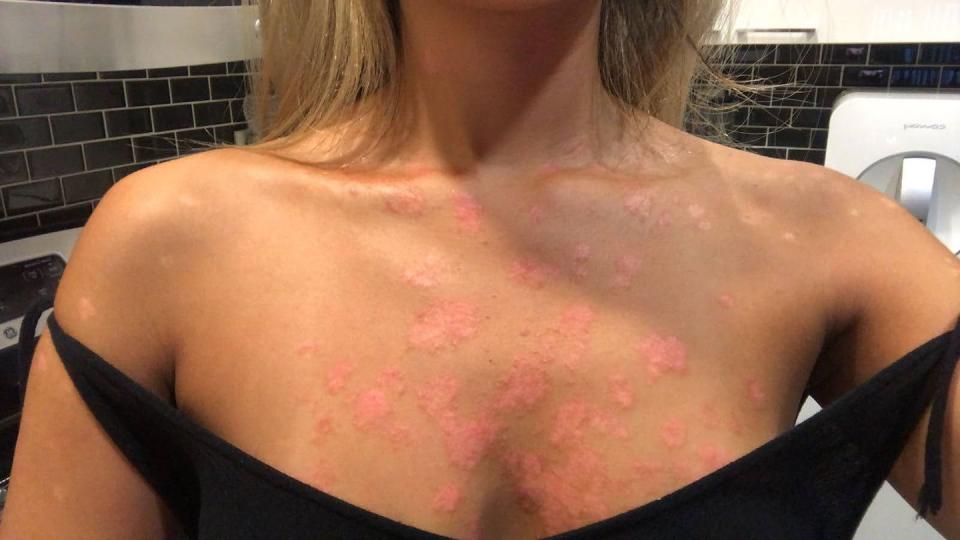
After another month or two, I watched as my skin got even worse.
I had red patches on my torso, face, breasts … everywhere. Some people have psoriasis that doesn't itch, but mine itched so badly. My mom (who I was living with at the time) tried applying Korean oils to my skin to attempt to heal it, but it continued to burn. The creams the dermatologist gave me didn’t work either, so I took a break from visiting doctors for treatment and just decided to let my skin flare.
My skin was raging. After being misdiagnosed with pityriasis rosea, I started Googling around and had a strong feeling that it was actually psoriasis. So, I went to a female dermatologist (who I had previously seen for acne treatment) with an agenda—I walked in and said, “I need a biopsy.” She ordered one and it was done right on my swimsuit line to hide any scarring.
Finally, after over a year of misdiagnoses and dead ends, the biopsy came back identifying plaque psoriasis, a chronic autoimmune skin condition that manifests as scaly patches of inflamed skin. In people with light skin tones, plaque psoriasis is characterized by raised, red or pink patches of skin with silvery-white scales. People with Black or Brown skin tones are more likely to have brown or violet-colored patches with silvery-white or gray scales.
It was validating that at least one doctor saw my symptoms and took them seriously, but getting a diagnosis was less of a relief than you'd think.
I'd hoped it would be a breath of fresh air to hear the truth, but I was still tired and didn’t feel well physically or mentally. Then came the trial and error of treatment. I went through a lot of options—from medicines to holistic treatments—and ultimately didn’t find anything that worked to clear my skin and didn’t cause side effects.
Doctors told me that I might have plaque psoriasis forever and that I might go in and out of remission, but they never talked about the "internal" symptoms that could arise. I learned about other underlying symptoms of psoriasis—like joint pain and stomach issues—on my own. I also learned that certain foods can either be triggers or “healers” for skin flare-ups and that stress is the number one trigger for me.
Another ramification of my diagnosis was emotional—dealing with people’s comments. Sometimes, people would ask me if I had a severe burn or if I had herpes, “in case I was contagious.” At first, I internalized those judgments from others and believed they were warranted.
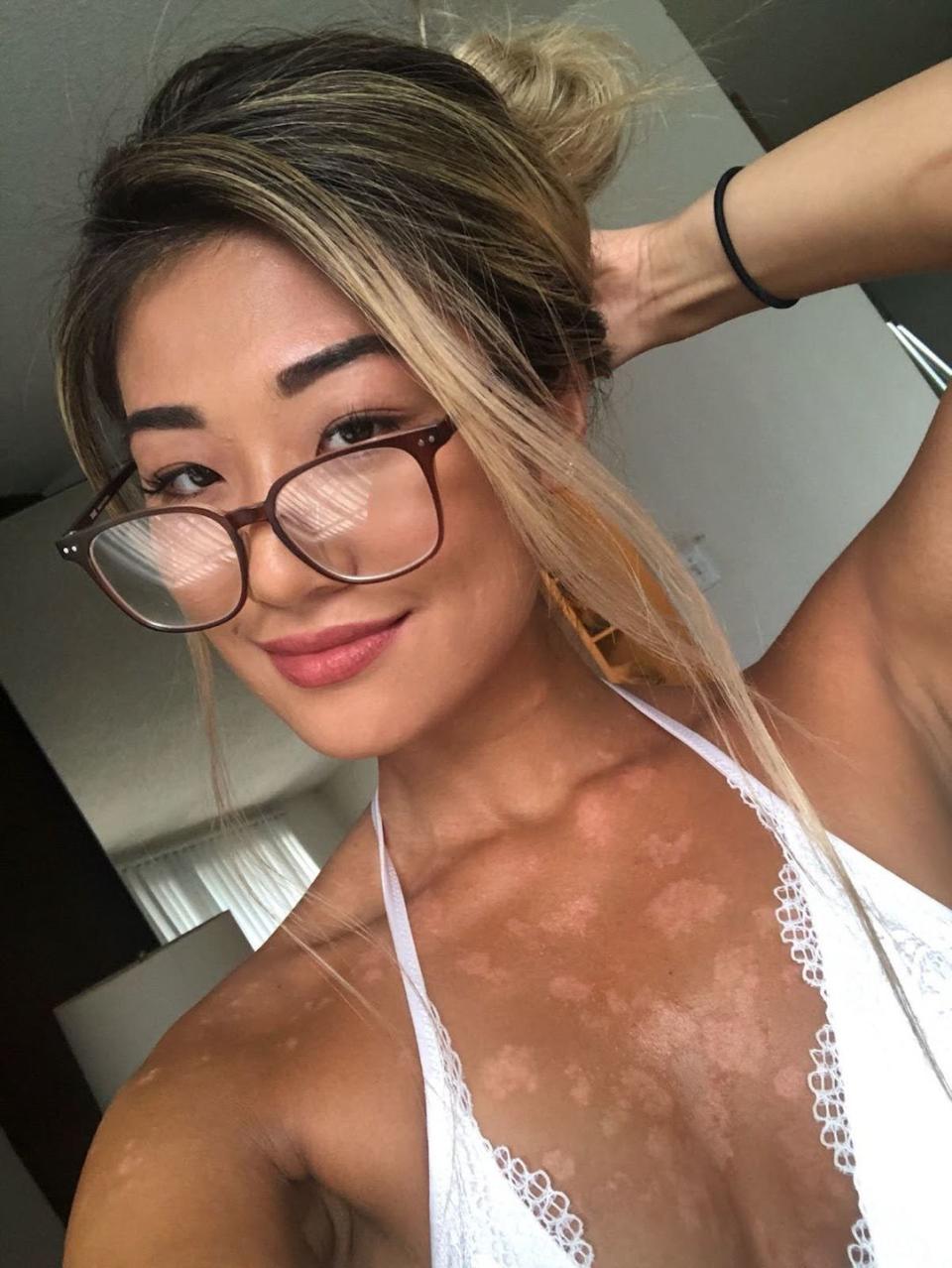
Then, when my psoriasis was at its worst, I got ghosted for a reality TV dating show spot, and my confidence tanked.
About five years ago, I was trying to be a model and pursue opportunities within the beauty world. My psoriasis was at its worst, and I was in the middle of interviews for the first season of a popular U.S. reality dating TV show. I stayed in a hotel and met with producers for weeks for interviews. The producers seemed to love me, and at the end of the final interviews, I recall them telling me something along the lines of “get ready to leave” (as in, you’re going on the show)—and they asked about my flight details.
Before filming starts, the producers always ask for updated photos of contestants in a swimsuit. At the time, I wasn’t at my full confidence level and often used clothes to hide my skin. After I sent bikini-clad pictures, I started getting breadcrumbed—and eventually, was completely ghosted [by the producers]. I couldn’t get a reply or answer about why I was not cast.
It felt to me as if they canceled my participation because of my plaque psoriasis, even though I will never know for sure what the reason was. Regardless, the experience left me feeling awful and out of control. I don’t want anyone else living with plaque psoriasis to experience that.
The rejection made me spiral: I internalized that I was hideous and untouchable because of my psoriasis. This led to a descent into depression—I wore long sleeves and jeans in the summer and wouldn’t leave my room. If I did, my face was full of caked makeup to hide my skin’s appearance.
Part of my struggle was that I never saw anyone who looked like me who had psoriasis.
Even in Google Images, the results always showed images of people with white skin, and never Asian skin or other skin of color. Because of my deeper skin tone and people’s negative reactions to my psoriasis, I felt dirtier than other lighter-skinned people who have it.
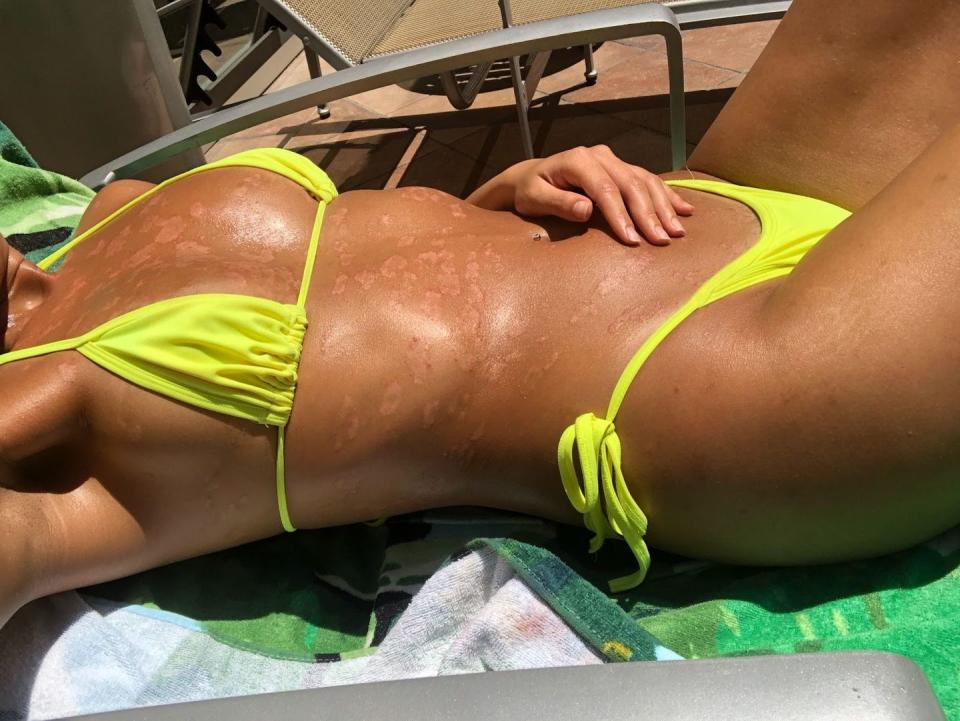
One weekend, my girlfriends planned a trip to Arizona for a pool party weekend. They helped build up my confidence and I decided that I wanted to go out and enjoy life, like a normal person. I found my smallest swimsuit and got ready for a weekend of partying—though I wasn’t drinking because I didn’t want my psoriasis to flare up. That weekend at the pool, a guy my group and I were partying with touched my back, jumped back, and asked if I had herpes, worried that he would catch it from me. It felt like such a slap in the face.
At that point, I was ready to start crying and leave the party when a guy—who is now my boyfriend of five years—stopped me, took my hand, and told me I was beautiful.
Finding a supportive community and romantic partner has made a huge difference for me.
When my psoriasis was at its worst, I didn’t know how to pull myself out of depression. I wish I could say I went to therapy, but growing up in an Asian household, these weren’t tools that were given to me. However, I’ve had a strong support system. My identical twin sister (who didn't have psoriasis at that time) has been super supportive, along with my mom, friends, and fellow psoriasis warriors I’ve met online.
I’m also thankful to have found a partner who saw me with my condition off the bat—I didn’t have to “reveal” my psoriasis to him and hope for the best. This doesn’t mean that I didn’t have insecurities, though—especially in the bedroom. At the time, I had so much psoriasis congestion in all the areas that are supposed to feel hot: my torso, butt, and vulva. It was uncomfortable and nearly impossible to wear underwear, let alone lingerie.
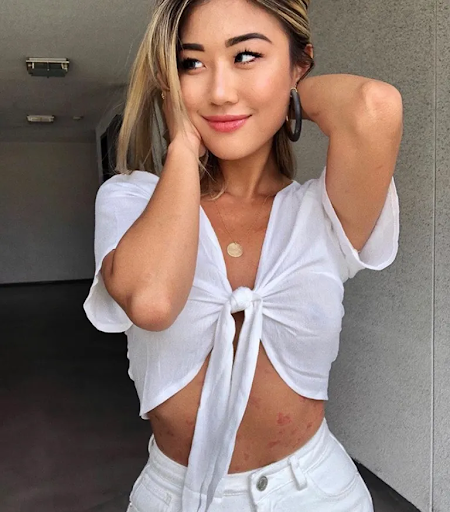
My partner has supported me throughout. But it has also been my confidence battle—and a lot of self-work—that has helped. If I can’t love myself, how will someone else love me? I used to see one mean social media comment and it’d bring me down. Now, I know my beauty is so much more than what’s on my skin—but it has taken me a while to get there.
I also finally found the right treatment for my psoriasis—a steroid-free plaque psoriasis cream called VTAMA—about a year ago. I wish I had used it all along because it’s been amazing for clearing up my skin and hasn’t caused adverse side effects.
Sharing my journey through photos has made me infinitely more confident in my skin.
In terms of showing my skin over time, I started small—first, I tried putting on a T-shirt and showing my arms to boost my confidence. It is all about loving my body with the dots and loving the shape of my curves along with them. I credit the online psoriasis community and seeing and connecting with other people whose dots look similar—I have found so much comfort and solace in that. It’s one reason why I started posting and connecting with people via my psoriasis-specific account on Instagram, @myspottedskin.
One of the most important things I’ve advocated for throughout my psoriasis journey is that you are never going to have “perfect skin.” I preach this to young girls, especially, who send me DMs about how they are bullied and so self conscious about their psoriasis. I emphasize this: Love yourself and love your skin in all phases.
You Might Also Like

